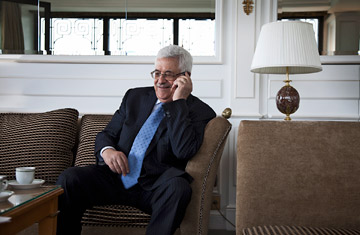
(6 of 6)
His predecessor was, of course, Arafat, who showed up at the U.N. in fatigues. Arafat, then chairman of the PLO, told the General Assembly he came with a gun in one hand and an olive branch in the other. Abbas has a different style. When he spoke from the same stage, he was wearing a suit and tie and he held aloft a sheaf of papers: the U.N. application.
Unlikely Convert
If Abbas retires, as he frequently says he wants to, he will leave with no clear successor. Polls show Palestinians would elect Marwan Barghouti, a charismatic Fatah militant not currently available; he's serving five life sentences in an Israeli prison. In recent months, Palestinian business leaders have talked up Khaled Meshaal, a notion that speaks volumes about the changes roiling Palestinian politics. Since 1996, Meshaal had held the most senior position in Hamas, the Islamic Resistance Movement, long the face of Palestinian terror. Its suicide bombings derailed Oslo, shattered Israel's peace wing and justified the separation barrier, the fence and wall that Israel is building around the West Bank.
Earlier this year, however, Meshaal endorsed the Abu Mazen approach. While reserving the right to violent resistance and not renouncing the Hamas Charter, which calls for the destruction of Israel, Meshaal said the time has come for negotiations with Israel and nonviolent protest in the spirit of the Arab Spring. "Now we have a common ground that we can work on--the popular resistance, which represents the power of the people," Meshaal said. He and Abbas sealed a deal for a unity government, ending (if only on paper) a rift that has seen the 1.6 million Palestinians in the Gaza Strip governed by Hamas and the perhaps 2.3 million on the West Bank under Abbas.
But the deal has come undone. Meshaal stepped down in September after failing to bring more than half of Hamas' leadership with him. East Jerusalem analyst Mahdi Abdul Hadi, who speaks with Meshaal regularly, said Egypt, which was midwifing the deal, asked Abbas to forgo his insistence on elections. Abbas refused, and the bargain collapsed.
To have a leader like Meshaal, whose organization dispatched numerous suicide bombers to kill Israeli civilians, adopt the Abu Mazen approach was still a remarkable philosophical victory for Abbas, even if the political victory remains elusive. Because as a whole, Hamas remains resistant to the Abbas-Fatah worldview. "Meshaal said, 'Let's embrace him, be in the system, get legitimacy,'" Hadi says. "Others in Hamas say, 'No, we don't need his system. Look what's happening in political Islam in the region. It's a matter of time. They'll have to deal with us.'"
That's exactly what Israel should understand, and quickly, say Abbas loyalists. Whatever new governments emerge from the Arab Spring, they are unlikely to be more understanding toward Israel than the bookish moderate who, when asked last October why he was going to the U.N., replied with one word: "Hope. All the time we give them hope." Supplies are running low. In April, 3 out of 4 Palestinians told pollsters they felt depressed.
